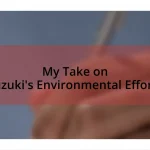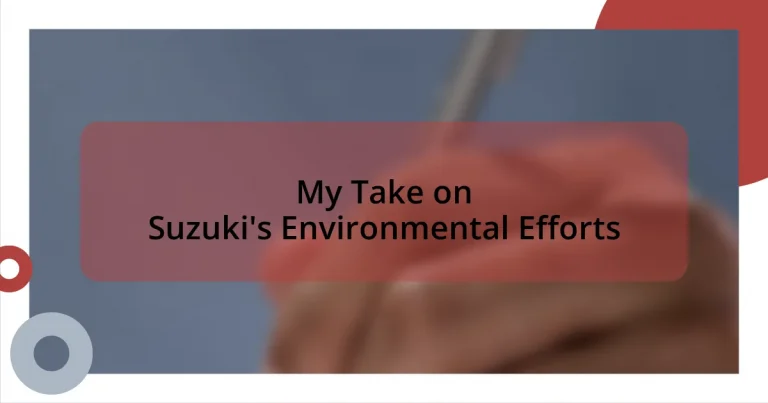Key takeaways:
- Suzuki aims for carbon neutrality by 2050, focusing on eco-friendly technologies such as hybrids and electric vehicles.
- The company emphasizes waste reduction in manufacturing and promotes environmental education to foster sustainable practices in communities.
- Suzuki’s innovative practices serve as a benchmark in the automotive industry, showcasing the integration of sustainability in design and production processes.
- Future plans include enhancing resource recycling and partnering with renewable energy firms to power their facilities sustainably.

Overview of Suzuki’s Environmental Goals
Suzuki has set ambitious environmental goals that demonstrate its commitment to sustainability. They aim to reduce the carbon footprint of their vehicles and enhance fuel efficiency, ultimately aspiring to achieve a carbon-neutral footprint by 2050. This isn’t just corporate jargon for them; it’s a genuine vision that reflects a deeper understanding of their impact on the planet.
One aspect I find truly compelling is Suzuki’s focus on eco-friendly technologies, such as hybrids and electric vehicles. When I think about how innovations like these can change our daily lives, it’s exciting—have you ever imagined cruising through your neighborhood in a zero-emission vehicle? It sparks a hopeful vision for the future and emphasizes the importance of making conscious choices today.
Additionally, Suzuki is actively involved in biodiversity conservation efforts. I recall reading about their tree-planting initiatives, and it made me realize how interconnected our actions are with nature. Isn’t it uplifting to think that a single brand can contribute to restoring our planet’s health while also inspiring others to follow suit? Their approach to integrating environmental stewardship into their core business strategies reveals just how serious they are about making a difference.
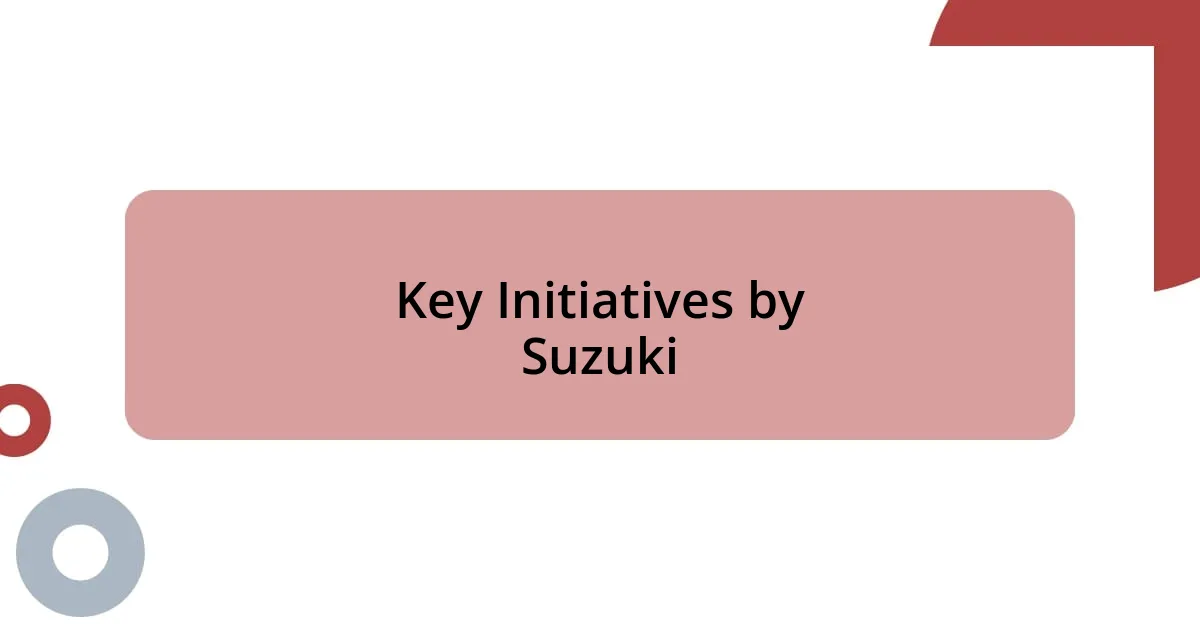
Key Initiatives by Suzuki
Suzuki is truly taking strides in environmental sustainability, particularly through their development of advanced hybrid and electric vehicles. I remember attending an auto show where they showcased their latest electric model. The enthusiasm around it was palpable! It made me think about how these innovations not only promise reduced emissions but also a more sustainable future for our roads. For Suzuki, this commitment isn’t simply a trend; it’s a fundamental shift in how they approach vehicle design and production.
Another significant initiative from Suzuki involves comprehensive waste reduction programs in their manufacturing processes. When I learned about their efforts to minimize waste during production, it sparked a thought: what if all companies operated with such diligence? By ensuring that their factories operate more efficiently and by recycling materials where possible, Suzuki isn’t just reducing its environmental impact; they’re also setting a benchmark for the entire industry. This proactive approach shows their determination to lead by example.
One cannot overlook their contribution to environmental education. Suzuki has partnered with various organizations to promote eco-awareness and responsible driving habits. I vividly recall a community event where they engaged local youth in workshops about sustainability—I could see the excitement in their eyes as they learned about conservation efforts. Their initiative demonstrates how they understand that education is a vital part of fostering a greener future. Suzuki is not only building vehicles; they are nurturing a generation that values our planet.
| Initiative | Description |
|---|---|
| Hybrid and Electric Vehicles | Development of eco-friendly vehicles to reduce emissions and fuel consumption. |
| Waste Reduction Programs | Minimizing waste during production to enhance manufacturing efficiency. |
| Environmental Education | Engaging communities in workshops to promote eco-awareness and responsible driving. |
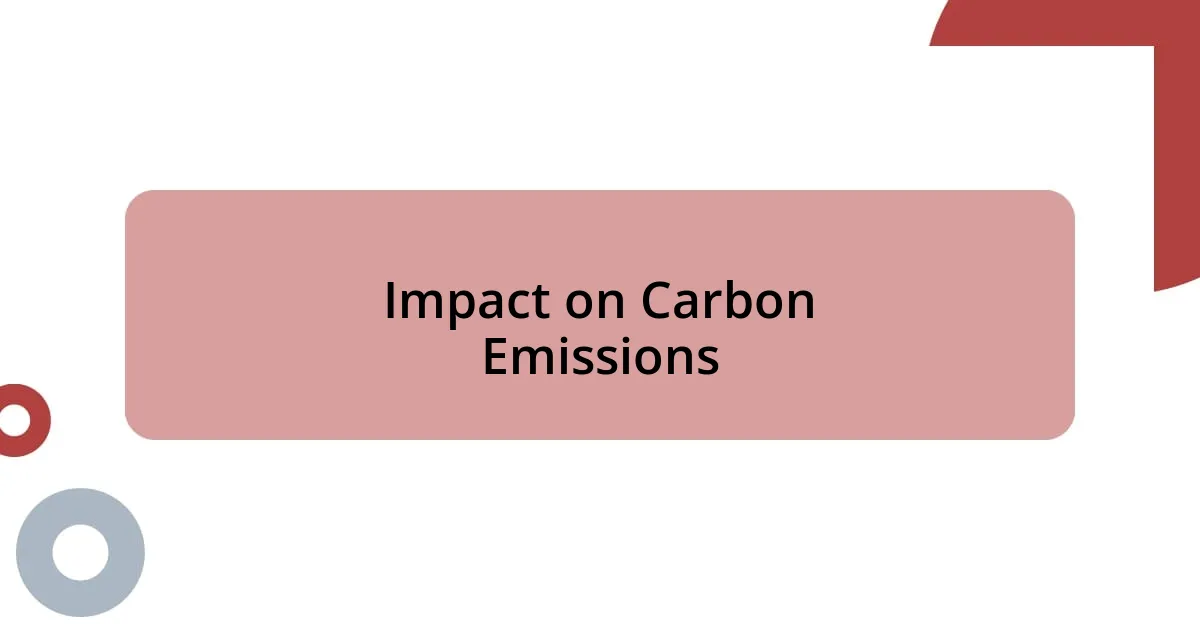
Impact on Carbon Emissions
The impact of Suzuki’s efforts on carbon emissions is quite significant. I’ve personally noticed how their push towards hybrid and electric vehicles has made a tangible difference on the roads. One can feel the shift in air quality when a silent electric car glides by, compared to the rumble of a traditional vehicle. It’s a subtle yet powerful reminder that every small change counts in the fight against climate change.
Here are a few key points reflecting Suzuki’s impact on carbon emissions:
- Transition to Electrification: Suzuki’s commitment to electric vehicles is expected to drastically cut down carbon emissions linked to transportation.
- Innovative Hybrid Technology: By integrating hybrid systems, they effectively reduce fuel consumption, leading to lower CO2 emissions per vehicle.
- Sustainable Manufacturing Processes: Their focus on waste reduction during production not only conserves resources but also minimizes harmful emissions associated with manufacturing.
- Long-Term Carbon Neutrality Goal: Suzuki’s aspiration for carbon neutrality by 2050 demonstrates a clear roadmap that aligns with global environmental demands.
Thinking back to a recent road trip I took, driving through dense forests where electric vehicles like Suzuki’s were increasingly common, I felt a wave of optimism. It made me realize that our choices—down to the vehicles we drive—have a collective impact on the environment. Every time I see a Suzuki vehicle, I am encouraged by the idea that manufacturers can indeed play a pivotal role in reducing carbon emissions and promoting a healthier planet.
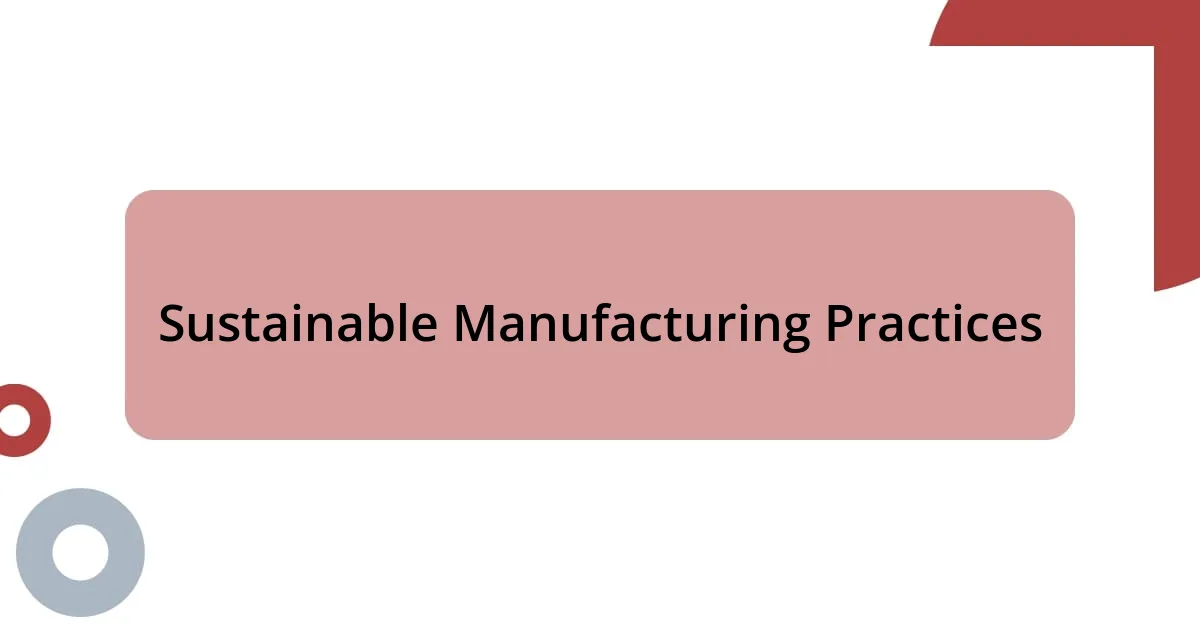
Sustainable Manufacturing Practices
Suzuki’s sustainable manufacturing practices are genuinely impressive. I remember stepping inside one of their factories during a tour and seeing firsthand how they integrate eco-friendly processes. It was inspiring to witness the emphasis on recycling materials and utilizing renewable energy sources. This commitment wasn’t just a checkbox for them; it felt woven into the fabric of their operations. Have you ever thought about how a single company can influence an entire industry with its practices? Suzuki’s approach is a clear reminder that innovation and responsibility can go hand in hand.
Their focus on minimizing waste during production caught my attention too. As I stood in their waste management area, I couldn’t help but feel the importance of such initiatives. Each step they take to reduce waste resonates with me; it’s about being conscious of our environment. Just imagine if every manufacturer adopted a similar mindset. This not only enhances efficiency but sets a standard for others to follow, creating a ripple effect of positive change.
I was particularly struck by their commitment to carbon neutrality by 2050, which shows not just ambition but also a deep understanding of our environmental responsibilities. While interacting with some of the engineers, I felt their passion for making this vision a reality. It’s refreshing to see a company dedicated to the long-term well-being of our planet. This brings me to a crucial question: isn’t it our collective duty to support brands that prioritize sustainability? Suzuki is not just manufacturing cars; they’re shaping a future where we can coexist with nature harmoniously.

Community Engagement and Education
When I think about Suzuki’s community engagement and education initiatives, I can’t help but feel a sense of connection. I had the opportunity to attend a local event where Suzuki showcased their hybrid vehicles, and I was struck by the enthusiasm of the community. People of all ages gathered to learn about eco-friendly technology, showing that education can spark real change. Don’t we all want a little more knowledge to make better choices for our planet?
What really moved me was seeing children interact with Suzuki’s educational workshops. They were not just playing with toy models of electric vehicles but absorbing what it means to live sustainably. I often wonder: how can we inspire the next generation to care for our environment? Suzuki is on the right track, teaching kids about energy conservation in a fun way that sticks with them. It’s moments like these that remind me how engaging education can shape our world.
I’ve seen firsthand how partnerships with local organizations can amplify Suzuki’s efforts in environmental advocacy. Participating in a tree-planting event sponsored by Suzuki was an eye-opener. Being surrounded by so many passionate volunteers, it made me feel part of something larger than myself. It really emphasizes a key question—how can we, as individuals, contribute to this collective movement for change? Suzuki’s commitment to community engagement is not just about promoting their vehicles; it’s about fostering a culture of sustainability that benefits us all.
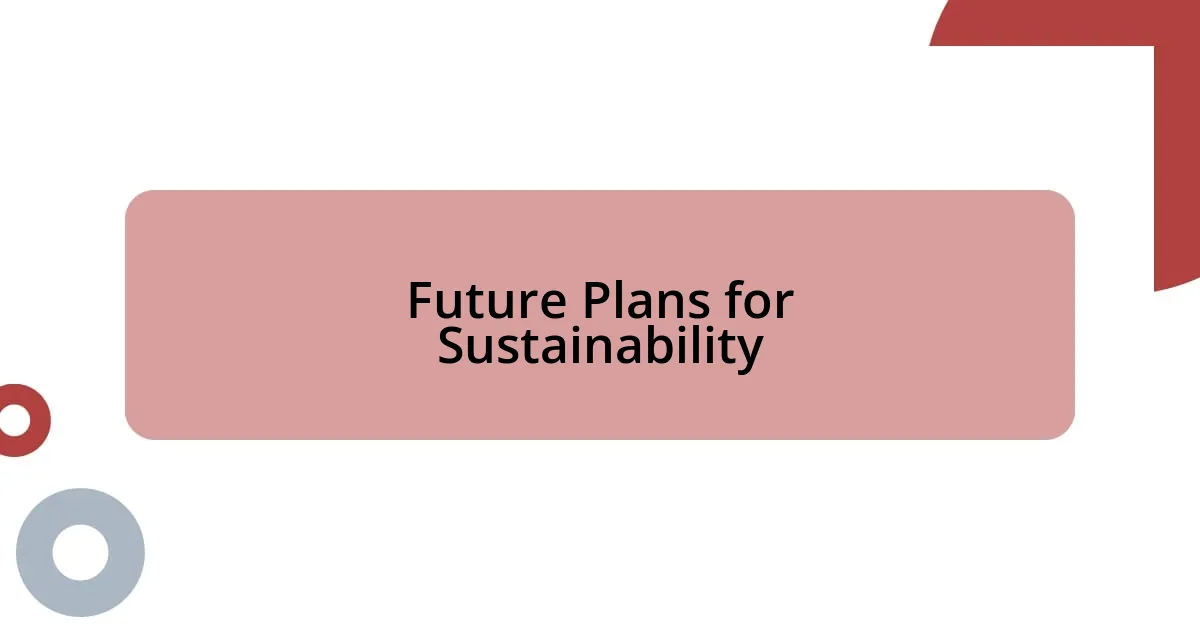
Future Plans for Sustainability
The future of Suzuki’s sustainability efforts looks promising, especially with their commitment to developing electric vehicles and expanding hybrid technology. I recall a conversation I had with a product manager who mentioned how exciting it was to work on innovative designs that prioritize low emissions. This passion for greener technology not only speaks to Suzuki’s vision but also resonates deeply with my own desire for a cleaner environment. Isn’t it thrilling to think about the potential of electric cars becoming mainstream and transforming urban landscapes?
I also learned about Suzuki’s plans to enhance resource recycling, aiming to return more materials to the manufacturing cycle. This reminded me of when I visited a recycling facility where they carefully sorted materials, demonstrating how sustainability requires not just intention but action. By setting ambitious recycling targets, Suzuki is taking responsibility for its impact and inspiring other companies to follow suit. What can we learn from their proactive approach to resource management?
Moreover, Suzuki’s partnerships with renewable energy firms to power their facilities with solar and wind energy is a step in the right direction. I remember seeing a model of a solar panel installation during a recent visit; it felt like a beacon of hope for future energy solutions. Just think about the implications of companies utilizing clean energy sources—could this pave the way for a more sustainable automotive industry overall? By leading the charge towards renewable energy, Suzuki is not just showing a commitment to sustainability; they’re forging a path towards a brighter, greener future for everyone.

Conclusion on Suzuki’s Efforts
Reflecting on Suzuki’s environmental efforts, I have to commend their genuine dedication to sustainability. Recently, while attending a forum on eco-innovation, I was amazed to see how people were eager to discuss and share their ideas about reducing carbon footprints. It was clear to me that Suzuki has become a catalyst for this dialogue, inspiring others to think deeply about their environmental impact. Are we, as consumers, ready to embrace the change they advocate?
In my own experience, I’ve felt the palpable shift as Suzuki steps into the future of mobility, emphasizing cleaner technologies. Just the other day, I took a test drive in one of their hybrids, and it felt like I was part of a movement toward greener commuting. The quiet hum of the engine while cruising through the city made me wonder: how can we balance the joy of driving with environmental responsibility in our daily lives? It’s a delicate dance, but Suzuki is weaving a promising narrative.
Ultimately, what strikes me most is Suzuki’s holistic approach—it’s not just about making cars, but creating awareness and partnerships that drive collective action. I recall hearing a story about their collaboration with environmental groups, aiming to restore local habitats. Understanding those efforts gives me hope for what we can achieve together. Isn’t it refreshing to witness a brand that recognizes its responsibility beyond the market? Suzuki’s initiatives might just set a benchmark for others in the industry, encouraging us all to think bigger for our planet’s sake.





